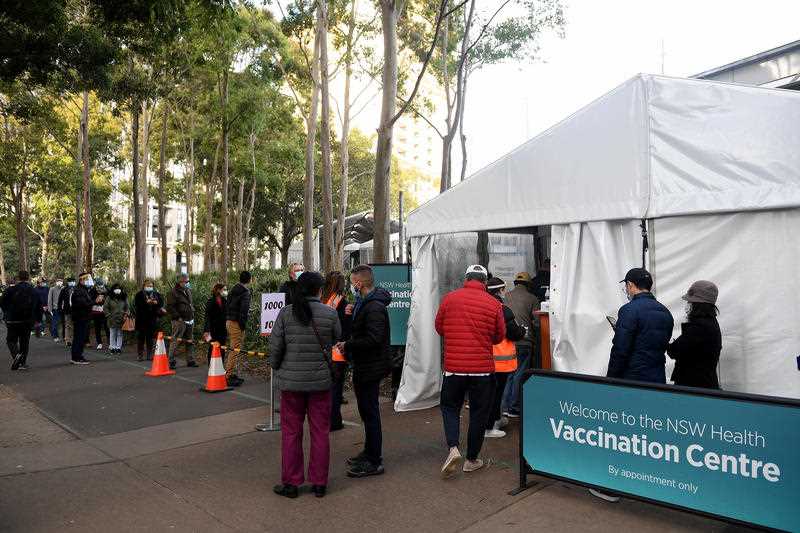Australians could soon receive coronavirus jabs at drive-through hubs, stadiums and shopping centres under an expanded vaccination rollout.
The federal government’s updated Operation COVID Shield vaccine campaign reveals plans for mass vaccination sites, which could also include supermarkets and conference centres.
Drive-through vaccination hubs in stadium car parks could be established in mid-August with the first trials next month before being widely used in October.
Jabs at work are slated to start in late September before operating in most states and territories by the end of November.
The Commonwealth Bank and Westpac will trial AstraZeneca vaccinations for staff and their families in Sydney’s hot spots from as soon as next week.
A retail pilot, which would include shopping centres and supermarkets, could be up and running in October.
Wesfarmers – which owns Bunnings, Kmart and Officeworks – offered its sites for mass vaccination hubs last month during a meeting with senior government figures.
Schools could also be used from December under state and territory government-run programs if experts approve Pfizer vaccine for 12- to 15-year-olds.
Vaccine rollout commander John Frewen said the measures would help reach the goal to offer all Australians a vaccine by the end of the year.
“What I would really like to see as we get late in the year is the maximum convenience available for people in Australia to get vaccinated,” he told the ABC.
Prime Minister Scott Morrison has released modelling underpinning a national cabinet in-principle agreement for reopening.
The Doherty Institute report, adopted by federal and state governments, recommends immunising younger adults to cut risks of transmitting coronavirus.
The institute’s epidemiology director Jodie McVernon said spread could be reduced across the population with many older people now vaccinated.
“What we’re advising now is a strategic shift to maximise those benefits by moving to younger groups who are key spreaders of infection,” she told ABC radio on Wednesday.
Professor McVernon said maintaining high vaccination rates in over-60s coupled with immunising younger people could halve the disease burden.
The modelling also shows the benefits of maintaining high quality testing, tracing and quarantine alongside low-level social distancing when 70 per cent coverage is achieved.
In the first 180 days of an outbreak 16 people would die with strong measures in place, while the toll could reach almost 2000 without effective restrictions.
Prof McVernon said deaths were inevitable once Australia moved to more open phases of the pandemic.
“We’re not going to lie about that but the reality is we can’t avoid COVID forever,” she said.
Australia’s leaders are gunning for a 70 per cent target to significantly reduce the prospect of major lockdowns and 80 per cent to all but end city-wide shutdowns.
Almost one-in-five people over 16 have received both doses of a vaccine.
NSW recorded 199 cases of local transmission on Tuesday, while there were 16 new infections in Queensland taking the latest cluster to 47.
By Matt Coughlan in Canberra, AAP



